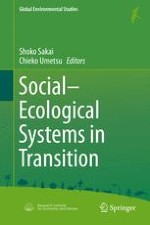
2014 | OriginalPaper | Buchkapitel
1. Theoretical Frameworks for the Analysis of Social–Ecological Systems
verfasst von : Graeme S. Cumming
Erschienen in: Social-Ecological Systems in Transition
Verlag: Springer Japan
Aktivieren Sie unsere intelligente Suche, um passende Fachinhalte oder Patente zu finden.
Wählen Sie Textabschnitte aus um mit Künstlicher Intelligenz passenden Patente zu finden. powered by
Markieren Sie Textabschnitte, um KI-gestützt weitere passende Inhalte zu finden. powered by